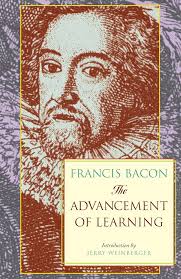The Advancement of Learning Page #41
The Advancement of Learning, published by Francis Bacon in 1605, is a foundational text in the history of science and philosophy. In this work, Bacon advocates for empirical research and the systematic organization of knowledge, laying the groundwork for the scientific method. The book critiques existing scholarly practices and proposes a new approach to learning based on observation and experimentation. It marks a significant shift towards modern scientific inquiry.
- Year:
- 1605
- 1,170 Views
Submitted by acronimous on August 11, 2024
Modified by acronimous on August 11, 2024
that pleaders should have the places, whereof they have most continual use, ready handled in all the variety that may be; as that, to speak for the literal interpretation of the law against equity, and contrary; and to speak for presumptions and inferences against testimony, and contrary. And Cicero himself, being broken unto it by great experience, delivereth it plainly, that whatsoever a man shall have occasion to speak of (if he will take the pains), he may have it in effect premeditate and handled in thesi. So that when he cometh to a particular he shall have nothing to do, but to put to names, and times, and places, and such other circumstances of individuals. We see likewise the exact diligence of Demosthenes; who, in regard of the great force that the entrance and access into causes hath to make a good impression, had ready framed a number of prefaces for orations and speeches. All which authorities and precedents may overweigh Aristotle’s opinion, that would have us change a rich wardrobe for a pair of shears. (8) But the nature of the collection of this provision or preparatory store, though it be common both to logic and rhetoric, yet having made an entry of it here, where it came first to be spoken of, I think fit to refer over the further handling of it to rhetoric. (9) The other part of invention, which I term suggestion, doth assign and direct us to certain marks, or places, which may excite our mind to return and produce such knowledge as it hath formerly collected, to the end we may make use thereof. Neither is this use (truly taken) only to furnish argument to dispute, probably with others, but likewise to minister unto our judgment to conclude aright within ourselves. Neither may these places serve only to apprompt our invention, but also to direct our inquiry. For a faculty of wise interrogating is half a knowledge. For as Plato saith, “Whosoever seeketh, knoweth that which he seeketh for in a general notion; else how shall he know it when he hath found it?” And, therefore, the larger your anticipation is, the more direct and compendious is your search. But the same places which will help us what to produce of that which we know already, will also help us, if a man of experience were before us, what questions to ask; or, if we have books and authors to instruct us, what points to search and revolve; so as I cannot report that this part of invention, which is that which the schools call topics, is deficient. (10) Nevertheless, topics are of two sorts, general and special. The general we have spoken to; but the particular hath been touched by some, but rejected generally as inartificial and variable. But leaving the humour which hath reigned too much in the schools (which is, to be vainly subtle in a few things which are within their command, and to reject the rest), I do receive particular topics; that is, places or directions of invention and inquiry in every particular knowledge, as things of great use, being mixtures of logic with the matter of sciences. For in these it holdeth ars inveniendi adolescit cum inventis; for as in going of a way, we do not only gain that part of the way which is passed, but we gain the better sight of that part of the way which remaineth, so every degree of proceeding in a science giveth a light to that which followeth; which light, if we strengthen by drawing it forth into questions or places of inquiry, we do greatly advance our pursuit. XIV. (1) Now we pass unto the arts of judgment, which handle the natures of proofs and demonstrations, which as to induction hath a coincidence with invention; for all inductions, whether in good or vicious form, the same action of the mind which inventeth, judgeth—all one as in the sense. But otherwise it is in proof by syllogism, for the proof being not immediate, but by mean, the invention of the mean is one thing, and the judgment of the consequence is another; the one exciting only, the other examining. Therefore, for the real and exact form of judgment, we refer ourselves to that which we have spoken of interpretation of Nature. (2) For the other judgment by syllogism, as it is a thing most agreeable to the mind of man, so it hath been vehemently end excellently laboured. For the nature of man doth extremely covet to have somewhat in his understanding fixed and unmovable, and as a rest and support of the mind. And, therefore, as Aristotle endeavoureth to prove, that in all motion there is some point quiescent; and as he elegantly expoundeth the ancient fable of Atlas (that stood fixed, and bare up the heaven from falling) to be meant of the poles or axle-tree of heaven, whereupon the conversion is accomplished, so assuredly men have a desire to have an Atlas or axle-tree within to keep them from fluctuation, which is like to a perpetual peril of falling. Therefore men did hasten to set down some principles about which the variety of their disputatious might turn. (3) So, then, this art of judgment is but the reduction of propositions to principles in a middle term. The principles to be agreed by all and exempted from argument; the middle term to be elected at the liberty of every man’s invention; the reduction to be of two kinds, direct and inverted: the one when the proposition is reduced to the principle, which they term a probation ostensive; the other, when the contradictory of the proposition is reduced to the contradictory of the principle, which is that which they call per incommodum, or pressing an absurdity; the number of middle terms to be as the proposition standeth degrees more or less removed from the principle. (4) But this art hath two several methods of doctrine, the one by way of direction, the other by way of caution: the former frameth and setteth down a true form of consequence, by the variations and deflections from which errors and inconsequences may be exactly judged. Toward the composition and structure of which form it is incident to handle the parts thereof, which are propositions, and the parts of propositions, which are simple words. And this is that part of logic which is comprehended in the Analytics. (5) The second method of doctrine was introduced for expedite use and assurance sake, discovering the more subtle forms of sophisms and illaqueations with their redargutions, which is that which is termed elenches. For although in the more gross sorts of fallacies it happeneth (as Seneca maketh the comparison well) as in juggling feats, which, though we know not how they are done, yet we know well it is not as it seemeth to be; yet the more subtle sort of them doth not only put a man besides his answer, but doth many times abuse his judgment. (6) This part concerning elenches is excellently handled by Aristotle in precept, but more excellently by Plato in example; not only in the
Translation
Translate and read this book in other languages:
Select another language:
- - Select -
- 简体中文 (Chinese - Simplified)
- 繁體中文 (Chinese - Traditional)
- Español (Spanish)
- Esperanto (Esperanto)
- 日本語 (Japanese)
- Português (Portuguese)
- Deutsch (German)
- العربية (Arabic)
- Français (French)
- Русский (Russian)
- ಕನ್ನಡ (Kannada)
- 한국어 (Korean)
- עברית (Hebrew)
- Gaeilge (Irish)
- Українська (Ukrainian)
- اردو (Urdu)
- Magyar (Hungarian)
- मानक हिन्दी (Hindi)
- Indonesia (Indonesian)
- Italiano (Italian)
- தமிழ் (Tamil)
- Türkçe (Turkish)
- తెలుగు (Telugu)
- ภาษาไทย (Thai)
- Tiếng Việt (Vietnamese)
- Čeština (Czech)
- Polski (Polish)
- Bahasa Indonesia (Indonesian)
- Românește (Romanian)
- Nederlands (Dutch)
- Ελληνικά (Greek)
- Latinum (Latin)
- Svenska (Swedish)
- Dansk (Danish)
- Suomi (Finnish)
- فارسی (Persian)
- ייִדיש (Yiddish)
- հայերեն (Armenian)
- Norsk (Norwegian)
- English (English)
Citation
Use the citation below to add this book to your bibliography:
Style:MLAChicagoAPA
"The Advancement of Learning Books." Literature.com. STANDS4 LLC, 2025. Web. 10 Mar. 2025. <https://www.literature.com/book/the_advancement_of_learning_3165>.








Discuss this The Advancement of Learning book with the community:
Report Comment
We're doing our best to make sure our content is useful, accurate and safe.
If by any chance you spot an inappropriate comment while navigating through our website please use this form to let us know, and we'll take care of it shortly.
Attachment
You need to be logged in to favorite.
Log In